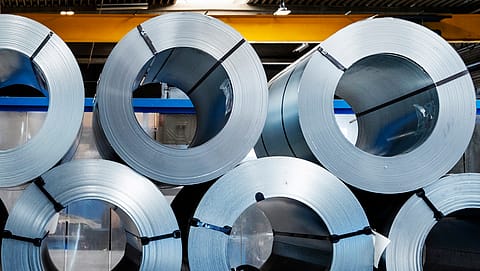Steel cos post 75-90% decline in EBITDA
The EBITDA per tonne of steel companies declined primarily due to steep fall in steel prices

What goes up also comes down. That is the nature of law. Indian steel companies aptly followed nature's rule and the scintillating performance that they staged in the past 2 years has reversed. Indian steel companies reported worse than expected second quarter performance as aggressive monetary tightening by central banks despite slowing global GDP along with China going into decline, weighed heavily on these companies.
The slowdown in performance is worrisome as steel was one of the biggest forex earning commodities for India in the last fiscal, a country that otherwise relies heavily on the import of commodities right from cooking oil to coking coal, to crude, and gold. The ballooning trade deficit is another matter of concern for the Indian government as the country's merchandise trade deficit has reached $148.46 billion in the first half of the fiscal while the rupee has lost approx 10% against the dollar in the calendar year.
Shining metal losing sheen
For the past two years, steel companies were the darlings of the street. But the fortune has turned its back and is evident from the massive fall of 75% to 90% in the Earnings before Interest, Taxes, Depreciation, and Amortisation (EBITDA) per tonne of steel companies within a time span of 15 months. The EBITDA per tonne of these companies declined primarily due to steep fall in steel prices. Prices of steel products dropped between ₹12,000 per tonne and ₹13,000 per tonne on quarter-on-quarter basis (QoQ). Also, lower export realisation due to export duty played a role.
EBITDA per tonne is the best gauge for the operational and financial performance of any mining company as the number reflects performance irrespective of the capital structure of these companies.
India’s largest steel manufacturer Tata Steel with a production capacity of 34 million tonnes per annum saw its reported consolidated EBITDA per tonne decline from ₹22,779 in Q1 FY22 (April-June 2021) to ₹8,673 in Q2 FY23 (July-Sep 2022), a 62% fall. In the same period, its standalone EBITDA per tonne declined by 70% from ₹33,568 to ₹9,986.
Tata Steel's consolidated operation includes 21 million tonnes per annum steel production capacity in India, 12 million tonnes per annum in Europe (7 million tonnes in Netherland and 5 million tonnes in the U.K.), and 1 million tonne in South East Asia. The Indian arm of Tata Steel produced 19 million tonnes of steel in FY 22.
India’s second largest steel manufacturer, JSW Steel with 28.5 million tonnes per annum of production capacity saw its consolidated EBITDA per tonne declining around 90% from ₹29,000 crore in Q1 FY22 to ₹3,000 crore in Q2 FY23. JSW consolidated numbers include steel manufacturing operations in the U.S. JSW Steel runs 1.5 million tonnes of the upstream unit in the U.S. while Indian production capacity stands at 27 million tonnes. In FY22, JSW produced 19 million tonnes of steel of which it exported 5 million tonnes of steel worth $5.3 billion accounting for approximately 25% of India’s forex earnings on the export of steel and steel products.
India’s third largest private steel manufacturer, Jindal Steel and Power Limited (JSPL) does not reveal EBITDA per tonne numbers but market based sources reveal that the company's consolidated EBITDA per tonne declined approximately 75% in the last 15 months. JSPL's adjusted consolidated EBITDA per tonne declined to ₹7,000 in Q2 FY23 from ₹28,000 in Q1 FY22. JSPL’s consolidated operation includes mining operations in Australia, Mozambique, and Africa. In the last fiscal, the company produced 7.64 million tonnes of steel.
In the last fiscal (FY22), India exported 13.5 million tonnes of finished steel but due to the global slowdown and government taxation policies on steel, export has dipped drastically. In the first half of the current fiscal, India’s steel exports dipped nearly 54% to 3.6 million tonnes viz a viz 7.8 million tonnes in the last fiscal.